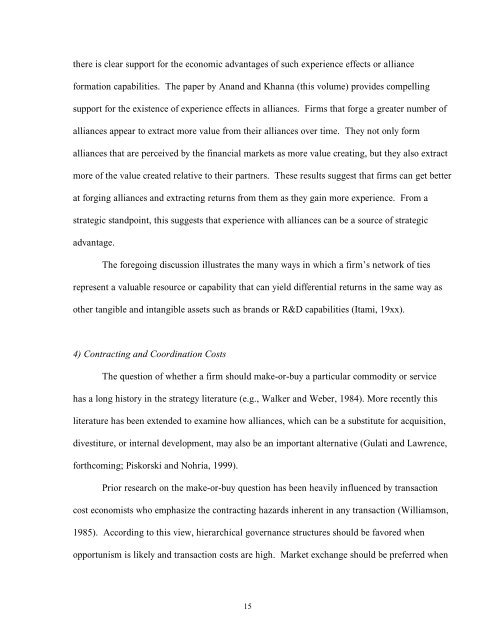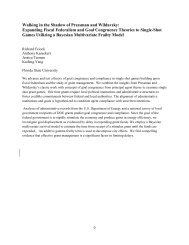STRATEGIC NETWORKS Ranjay Gulati, Nitin Nohria, Akbar Zaheer ...
STRATEGIC NETWORKS Ranjay Gulati, Nitin Nohria, Akbar Zaheer ...
STRATEGIC NETWORKS Ranjay Gulati, Nitin Nohria, Akbar Zaheer ...
Create successful ePaper yourself
Turn your PDF publications into a flip-book with our unique Google optimized e-Paper software.
there is clear support for the economic advantages of such experience effects or allianceformation capabilities. The paper by Anand and Khanna (this volume) provides compellingsupport for the existence of experience effects in alliances. Firms that forge a greater number ofalliances appear to extract more value from their alliances over time. They not only formalliances that are perceived by the financial markets as more value creating, but they also extractmore of the value created relative to their partners. These results suggest that firms can get betterat forging alliances and extracting returns from them as they gain more experience. From astrategic standpoint, this suggests that experience with alliances can be a source of strategicadvantage.The foregoing discussion illustrates the many ways in which a firm’s network of tiesrepresent a valuable resource or capability that can yield differential returns in the same way asother tangible and intangible assets such as brands or R&D capabilities (Itami, 19xx).4) Contracting and Coordination CostsThe question of whether a firm should make-or-buy a particular commodity or servicehas a long history in the strategy literature (e.g., Walker and Weber, 1984). More recently thisliterature has been extended to examine how alliances, which can be a substitute for acquisition,divestiture, or internal development, may also be an important alternative (<strong>Gulati</strong> and Lawrence,forthcoming; Piskorski and <strong>Nohria</strong>, 1999).Prior research on the make-or-buy question has been heavily influenced by transactioncost economists who emphasize the contracting hazards inherent in any transaction (Williamson,1985). According to this view, hierarchical governance structures should be favored whenopportunism is likely and transaction costs are high. Market exchange should be preferred when15




